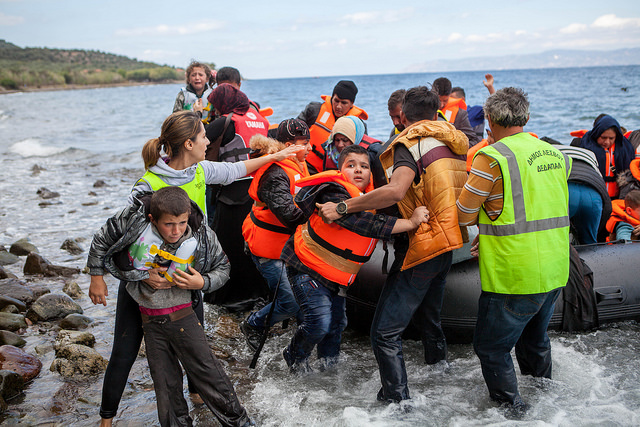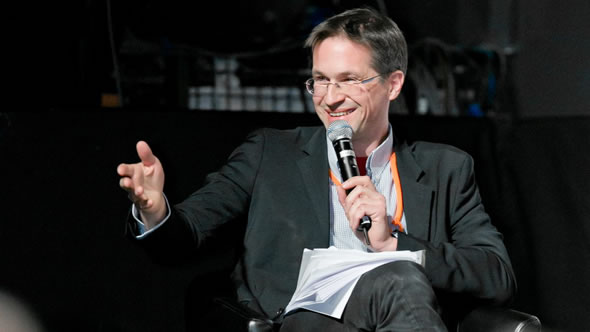Stockholm – ESI public lecture: EU, Turkey, Germany, Sweden and the refugee crisis

The Institute for Turkish Studies at Stockholm University (SUITS) and the European Stability Initiative (ESI) cordially invite you to an open lecture on
EU, Turkey, Germany, Sweden and the refugee crisis
Date/Venue
Friday, 20 November 2015, 13.00-14.00
Hörsalen, Medelhavsmuseet, Fredsgatan 2, Stockholm
The Syrian refugee crisis is putting a huge strain on the EU. What is to be done? What is happening in key EU countries? Which proposals stand any chance of making a difference? Which role could Turkey play? The European Stability Initiative has long argued that Germany and Turkey hold the key to any solution. In recent weeks its analyses and proposals have been widely quoted by policymakers and journalists throughout the EU.
ESI's Gerald Knaus will discuss the challenges and possible solutions for further cooperation between the EU and Turkey and the special roles for Germany and Sweden.
The discussion will be moderated by Dr Paul T Levin, SUITS.
In recent weeks, ESI has presented its proposal in Brussels, Warsaw, Ankara and Turkey, Vienna, and Moscow. Presentations in Berlin and Sofia are forthcoming.
The proposal has triggered substantial media interest, particularly in Germany:
- Die Zeit, "Erdogan braucht Deutschland" - Interview with Gerald Knaus - (also available in English:"Erdogan needs Germany") (15 October 2015)
- The Guardian, Ian Traynor, "EU leaders ask Erdogan to back radical refugee plan" (5 October 2015)
- Frankfurter Allgemeine Zeitung, "Die Festung, die keine ist" (also available in English: "This is not a fortress") (5 October 2015)
More media reactions are available on ESI's website.
Gerald Knaus is the founding chairman of ESI, an independent, not-for-profit think tank registered in Berlin and Istanbul. After studying in Oxford, Brussels and Bologna, Mr. Knaus taught economics in Ukraine and worked for NGOs and international organisations in Bulgaria and Bosnia and Herzegovina. In 1999, he founded ESI where he has co-authored more than 70 ESI reports. He is a founding member of the European Council on Foreign Relations and was for five years an Associate Fellow at the Carr Center for Human Rights Policy at Harvard University's Kennedy School.

Gerald Knaus
Background
In recent weeks, EU institutions have tried to respond to the refugee crisis. They have failed. Levels of trust between Turkey and the EU have been low for years. Recent EU tactics trying to win Turkey's help in the refugee crisis have not helped.
Senior Turkish officials describe the current talks as a game of poker: "In poker, it matters what the first hand is that you show; it better be serious." In this case, the EU's first, second and third hands were far from serious. The most concrete proposal in the Draft Action Plan the EU presented to Turkish president Erdogan in Brussels in early October – a promise to "mobilise up to € 1 billion" in support for Turkey – involved relabelling pre-accession funds that had already been committed. As Prime Minister Davutoglu told a European counterpart recently, to treat this as a generous EU gesture "is an insult to our intelligence".
Anybody familiar with the tortuous history of EU-Turkey talks on visa liberalisation and the readmission of migrants also notices that the Action Plan contains nothing new. There are no new promises, commitments or incentives. Leaks to the press that there might be billions in additional funds for Turkey, "accelerated visa facilitation" (a red-flag concept in Ankara, and different from visa liberalisation, which means the abolition of the visa requirement like in the Western Balkan countries and Moldova in recent years), or that six accession negotiation chapters might be opened (or not, depending on Cyprus) cannot hide the fact that the EU and Turkey are no closer to a joint strategy on how to deal with the refugee crisis today than they were one month, or three years, ago.
Currently the EU pretends to offer Turkey something, and Turkey pretends that it will make an additional effort to stop refugees leaving. Neither side is serious. The EU and Turkey act like an old couple, condemned to stay together, but without love or respect left. Divorce is not an option; no family therapist is available; and every attempt to 'agree' on something confirms, in its frustrating failure, what both think about each other. Only this time the house is burning.
- ESI newsletter: Merkel in Ankara – Fences that kill – A safe third country (18 October 2015)
- ESI background: Turkey as a "Safe Third Country" for Greece (17 October 2015)
- ESI compilation: The 2015 Refugee Crisis through statistics (17 October)
- Die Zeit, "Erdogan braucht Deutschland" - Interview with Gerald Knaus - ("Also available in English: Erdogan needs Germany") (15 October 2015)
- ESI policy proposal: The Merkel Plan – Restoring control; retaining compassion – A proposal for the Syrian refugee crisis (4 October 2015)
- ESI newsletter: The Merkel Plan – A proposal for the Syrian refugee crisis (4 October 2015)
- ESI newsletter: Refugees as a means to an end – The EU's most dangerous man (24 September 2015)
- ESI newsletter: Saving lives in the Aegean – Teaching war in school (18 September 2015)
- ESI policy proposal: Why people don't need to drown in the Aegean (17 September 2015)
- More media reactions to ESI's proposal
- ESI's website on the visa liberalisation process with Turkey in English / in Turkish
